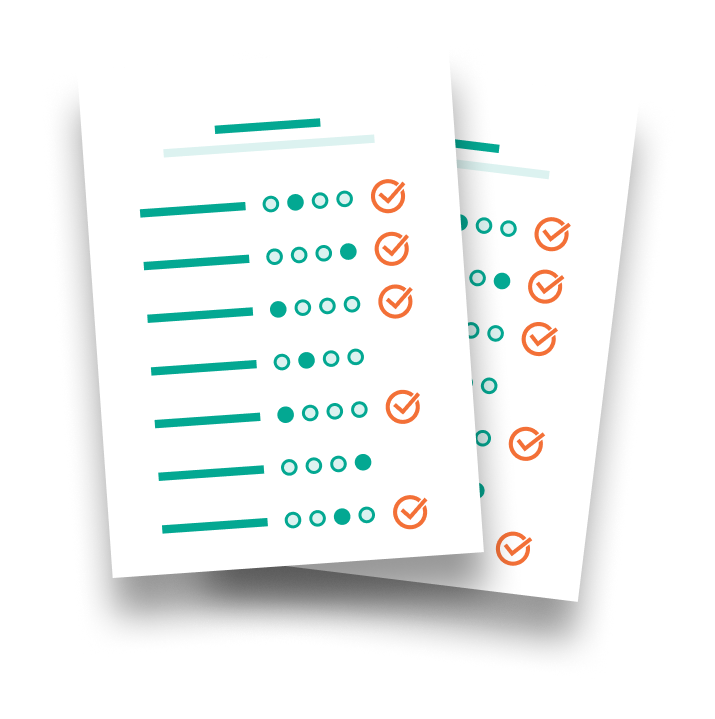MTLE Elementary Education (K-6) Scoring Guide

If you plan to teach elementary school in Minnesota, you may have heard of the MTLE Elementary Education (K-6) exam. This exam assesses whether you have the requisite skills and knowledge to teach a broad range of subjects to this age group.
To prepare for the test, it’s crucial to understand its scoring system. This article delves into everything you need to know about MTLE Elementary Education (K-6) exam scores.
Overview of the MTLE Elementary Education Exam
The MTLE Elementary Education (K-6) exam will evaluate your knowledge of basic content with these three subtests:
- Reading, Communication Arts (191)
- Mathematics, Health/Fitness and Fine Arts (192)
- Science, Social Studies (193)
Overall, the test consists of 150 multiple-choice questions, which you will have a total of 3 hours to answer. Our MTLE Elementary Education (K-6) exam overview can give you more information about the structure of this test.
How the Exam is Scored
The MTLE Elementary Education exam is scored by taking the sum of your correct answers and converting this into a scaled score that takes test difficulty into account. The exam is scored via computer.
Passing Score
To pass the MTLE Elementary Education (K-6) exam, you must pass all three subtests. The minimum passing score for Reading, Communication Arts (191) is 229. The minimum score for the other two subtests is 230.
For more scoring information on the individual subtests check out our Scoring Guides for each subtest:
MTLE Elementary Education: Reading, Communication Arts (191) Scoring Guide
MTLE Elementary Education: Mathematics, Health/Fitness and Fine Arts (192) Scoring Guide
MTLE Elementary Education: Science, Social Studies (193) Scoring Guide
Understanding Your Score Report
Your MTLE Elementary Education (K-6) score report will include:
- Whether you passed
- Your score on each subtest
- The minimum passing score for each subtest
- Your performance indices for the content areas on each subtest
- A detailed performance breakdown by content area
To see an example of what your score report will look like, check out this sample MTLE score report.
Your score report is broken down into four sections:
Section 1 includes:
- The name and number of the exam(s) you took
- The date you took the exam
- Whether you passed or failed the exam
- The exam’s score range and minimum passing score
- Your score on the exam
Section 2 includes:
- Each subtest of the exam you took
- How you performed on the individual content areas of each subtest (as shown by performance indices ranging from + to ++++)
Section 3 includes:
- Which subtests of an exam you have passed so far (and on what date)
- Which subtests you have failed to pass or still need to attempt
Section 4 includes:
- The number of test questions that corresponded to each content objective
- The percentage of questions you answered correctly for each objective
Retaking the Exam
If you don’t pass the MTLE Elementary Education (K-6) exam, you can retake it. You will need to re-register and submit a new payment, but you only have to register for the subtests you have yet to pass. Note that you must wait 30 days before you can retest.
Before you re-register, it’s crucial to evaluate what went wrong on your previous attempt. Carefully analyze your score report to identify areas of weakness and develop a targeted study plan to improve your performance on those subtests or content areas.
Conclusion:
The MTLE Elementary Education (K-6) exam scores play a significant role in assessing your readiness to teach young students in Minnesota. Understanding how this test is scored and what is required to pass should help you prepare more effectively, maximizing your chances of success. If you don’t pass the exam on your first try, remember to take advantage of the detailed performance breakdown on your score report. It may provide helpful insights.
With diligent study and a clear understanding of the test, you will be prepared to excel on the MTLE Elementary Education (K-6) exam.
More MTLE Elementary Education (K-6) Resources!
- Start your test prep with our free MTLE Elementary Education practice tests.
- Dig deeper into the structure of the exam using our MTLE Elementary Ed (K-6) exam overview.
- Looking for even more study help? Check out our MTLE Elementary Education (K-6) study guide.
FAQ
What is the passing score for the MTLE Elementary Education (K-6) exam?
To pass the MTLE Elementary Education (K-6) exam, you must pass all three subject exams. The minimum passing score for Subtest I is 229. For Subtests II and III, the passing score is 230.
When will I receive my MTLE Elementary Ed (K-6) score report?
You’ll receive your preliminary results immediately after finishing the exam. Within a month, you’ll receive your official score report. Visit the MTLE website to find out when you can expect your score report to be released.
If I fail the MTLE Elementary Ed exam, am I allowed to retake it?
Yes, if you do not pass, you can retake the exam. Please note you must wait 30 days before you can register again.



